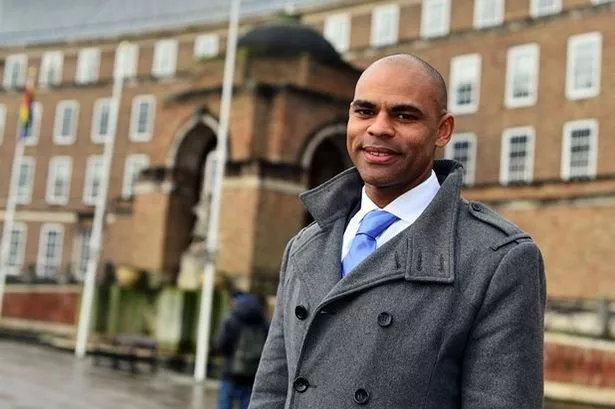Bristol Mayor Marvin Rees gave his second annual statement in City Hall on Tuesday night.
Mr Rees, who was elected into the top job last year, touched upon various issues in his speech.
You can read it in full here.
I have taken this opportunity to reflect on what my administration has delivered, the work we are doing to prepare for the next few years and to take stock of the things we haven’t yet been able to do.
My first speech came as I barely had my feet under the table. Having made that speech, it soon became apparent that the financial situation was not as robust as I was allowed to believe. As a direct result I have needed to revisit some of the things we thought we could do in this first year.
That experience highlighted the need to fix the council and I have spent part of my first year ensuring the council is more responsive to the political leadership and to the wider needs of the city. The Bundred report was a key part of that, highlighting the collective failure of leadership in achieving past saving and in how the council managed the process.
My first budget was carried in the light of that report. We decided to make it an interim budget to give us the space needed to build a medium-term financial plan and a robust financial system to ensure we don’t face these kind of problems in the future.
One year on, I believe my administration is driving forwards, delivering on our key pledges and the manifesto commitments the people of Bristol voted for.
I want to start this evening with some thanks. I want to thank our city partners, my cabinet and all the people working with us to tackle today’s challenges and plan for a better future for Bristol.
No Mayor, no leader nor the whole council can deliver for a city working alone. We need friends. I have spent my first year building relationships and collaborating with the city itself and it is already proving its worth. Many people have come forward to work with us to meet the city’s challenges.
I want to offer a particular thank you to the Labour group, my colleagues who sit in this chamber on behalf of the Labour party. They had the courage to get elected in the face of austerity, to carry a difficult budget for the city in 2017, facing up to the responsibility that comes with leadership. Together we have squared up to the challenges that we inherited and continue to be heaped upon us, while others have stepped aside. You showed real city leadership and you are now the team delivering on our manifesto. Each one of you now has responsibility for one or more of our manifesto commitments, becoming accountable for delivery. You don’t just talk, you lead and do. Thank you.

The government has set out its stall over the last seven years to shrink the footprint of city government and it is clear, that for as long as they hold on to power, they will continue to do so.
As a result we are dominated by headlines about cuts and protests. And that is understandable and we must deal with that. But we should not fall into the simplistic world where it’s all we talk about. It is crucial to remember the council still has responsibility for spending £1.2billion in the city and is the biggest provider of services in Bristol. We are not just about managing and opposing cuts. Our job and the budget process is about making sure we spend public money in the most impactful and cost effective ways.
The people who access council services are of course often among the poorest and most vulnerable citizens in the city. That doesn’t mean they need people telling them what they need. They know they are at the brunt of this government’s myopic commitment to austerity and they know where the blame lies. Nonetheless, they wouldn’t thank me for walking away from the challenge of building effective relationships with partners to get the investment we need and take up the role of merely shouting from the side-lines.
I respect the people who are losing services and want to protest and need to have their voice heard. I am listening and doing my best to work with communities to find solutions. But I say clearly to the people who live out their existence on social media and call for me to turn the council into a protest movement - now understand this and don’t be confused – I am against austerity and say so in Westminster clearly and loudly, most recently only a few days ago.
But anger at cuts must be directed to the government, the people who actually reduce the council’s income and shrink our positive impact on the city. Railing against the council may be personally gratifying and may win some online profile, but it doesn’t deliver for poor people. It is a sure thing however that walking away from the challenge of setting a legal budget would be a total abdication of responsibility. The calls to set an illegal budget is the easy option, birthed in irresponsibility and patronises the hundreds of thousands of people in Bristol who pay their council tax and want a democratically elected, financially competent authority, who want a provision of services but also want a growing economy and a better, thriving city. If we don’t balance our budget we get headlines but we sacrifice all these things.

And I want to hold a mirror up here because we have to face up to the fundamental challenge posed by race, class, gender and power. These are the defining features of the modern world. There are people holding politics to a standard for equality and inclusion they themselves are not delivering. The challenge is particularly stark for those social movements that claim to be at the forefront of progressive politics. The worldview I bring to this challenge is grounded in the Bristol my family and I grew up in, not one I read about or discussed in a university seminar.
In the general election cities across the UK rejected austerity and demanded investment. This was particularly true in Bristol where we returned four Labour MPs to work with a Labour Mayor and Labour majority council. I look forward to us working with our MPs as we identify the best way to pressure a government that is lacking credibility. We want an end to the hopelessness of austerity and a return to investment and hope. And we want Westminster to understand that our cities don’t only need more money and power to shape what happens inside our boundaries. We also want to shape context within which we live - and I will lead that argument nationally and internationally with the core cities and with the global parliament of Mayors.
For those who want to express criticism and spread negativity to build their own political brand let me be clear – I really am for the many, not the few. And the many know where the blame lies. And the many, just like our own party leader, want city leaders to do the best they can.
Some want to win headlines and build their social media following - we want to build the city: by building houses, building schools, building communities and building lives.
In the name of getting real stuff done I have called on the core cities, who are the drivers of the national economy, to work together on taking a joint approach. We will jointly challenge the government to admit the full cost of the cuts and to win investment for our cities, which, when it comes to social care and looking after our most vulnerable people, are at breaking point.
I have a straightforward approach
1) We will take our responsibilities seriously, manage services, and deliver a financially competent local authority,
2) We will work with city partners to grow a sustainable, inclusive economy that provides decent jobs and opportunity for all,
3) We will work with cities in the UK to take the argument to government for a better, fairer deal
Protesting has its place but we also need a clear, thought out, alternative vision and strategy for cities. You won’t grow a mass movement without solutions. People need something to believe in beyond something to protest against. “No cuts” is an important message but is not an end state. Public services are a means to an end, and we have to be clear what that end is. That’s why, as core city leaders, we are working on our own green paper for cities and set out what cities must become for their populations – we will argue that case with government, along with our strong Labour opposition in parliament and be clear about what we need.

And now, as it is the annual statement, I want to spend a few minutes highlighting what my administration has delivered to date:
I obviously haven’t got time to list them all, but they include:
- signed off a devolution Deal and created the West of England combined authority securing long term delivery on housing and infrastructure,
- reviewed the 2016 elections to make improvements in local democracy and ongoing work on voting registration,
- are building a heat network across the city,
- overhauled sporting development in the city,
- were the first council in the UK to ban the box for ex-offenders,
- changed the council leadership team,
- we completed work on the gender and race pay gap,
- are bringing investment to the city while opening up the city to refugees,
- changed the decision making pathway of the council to reflect political leadership and direction, delivered on promises on green capital,
- And initiated a campaign to clean up Bristol.
We have established a city office, bringing together city partners from the private, public and voluntary sectors, including trade unions and charities.
We’ve launched major pieces of work on
- Homelessness
- Quality Work experience
- And tackling hunger
We are rapidly delivering on our pledge to tackle the city’s housing crisis. We have
- Taken back land,
- Recovered empty properties,
- Signed an ethical lettings charter,
- Given housing priority to women escaping domestic violence abuse,
- Established the big housing conversation to prioritise tenants voices
- Chased owners on stalled sites,
- And brought new developers into Bristol,
- and we have worked with all developers to build and deliver housing with a good ratio of affordable homes, including right in the heart of the city.
The agreement at Alderman Moore’s to build houses for sale to fund building council housing is a financial model that is truly ground breaking.
We
- made city recommendations on Brexit,
- are working with the city on an innovative project to co-ordinate corporate social spend to create a city fund ,
- and are channelling ethically motivated investment for community led projects.
This is all part of developing a new approach in the city, reducing powerlessness and dependence and recognising that the council’s offer will have to change in the face of shrinking finances.

We are taking an asset based approach to city governance working with our community’s strengths rather than repeatedly reminding them of their weaknesses and describing what people are not.
Transport remains a priority. We have
- given local councillors the chance to review RPZs ,
- stopped enforcement against blue badge holders,
- we have also started working with key stake-holders, including bus operators and taxi drivers, with whom we held an industry conference this year,
- and are close to completing MetroBus.
- We are also making progress as we drive to improve people flow, making improvements to our road network, prioritising public transport but also improving the road experience for all users.
- Changed road layouts in the city centre have improved times to get across the city centre and changes to Temple Gate will speed up traffic in a heavily congested area.
- I am also launching a ‘no idle roadworks policy’ with better controlled roadworks, and opportunities for citizens to report idle times.
But, of course, we need a bigger solution. I have recently launched a congestion task group that will look at quick wins as well as take a more strategic look at our transport solutions and air quality. Bristol is the only major city without an effective mass transit system. We are looking imaginatively at exciting possibilities, learning from around the world. More on that in the near future.
It is also worth mentioning we are in the process of working with the fire service to check every one of our tower blocks.
And finally, I want to comment on this room, and on the politics in the city. I set up a cross party cabinet and offered collaborative working, so we can all work together to help improve the city. I’m grateful to the people in my cabinet for their hard work and indeed to the leader of the opposition, who accepted my offer to come and work with us on the congestion task group. My offer of collaboration remains. I again ask all party leaders to bring forward what they want to achieve for the city.
The idea of getting rid of elections by thirds was to stop the permanent electioneering that undermined collective action and held the city back. I can understand why you want to promote your party in 2019, but surely we can get things done together, for a couple of years.
But I’m not going to wait forever. If you just want to play at opposition fill your boots, and we will just crack on -- we want to put solutions on the table and get things done.
I finish by saying to the whole city –I am ferociously ambitious for Bristol, we’re facing massive challenges but we are also achieving and will continue to do so. I am excited and looking forward to working with you in the next year and those beyond.
























